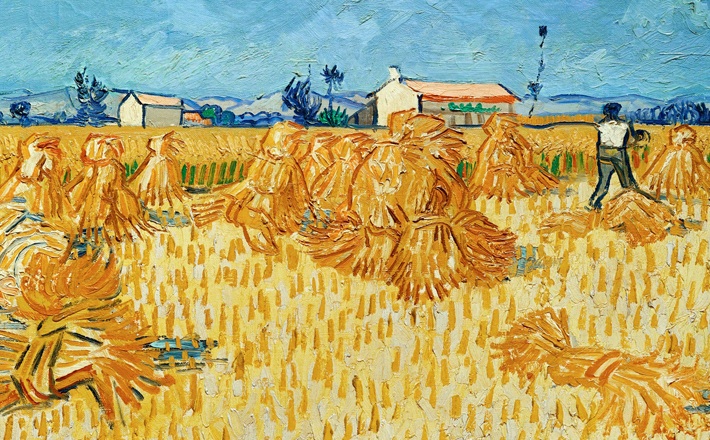Commentary on Luke 10:1-11, 16-20
When we think of Jesus’ followers we think of the twelve apostles, but there were more.
This story speaks of the seventy whom Jesus sent out. This was a kind of “internship,” a training time while Jesus was still with them. The mission was the same as Jesus’ own ministry: “cure the sick” and “say to them, ‘the kingdom of God has come near to you.’”
Jesus sends them “ahead of him … to every town and place where he himself intended to go.” He is on his way to Jerusalem and will probably travel through villages where he has not been before. Rumors of what Jesus is doing have undoubtedly spread into Samaria so the seventy emissaries will announce his coming by giving people a preview of his own work. It is also a preview of the ministry Jesus gives us today. We go “ahead of him,” bringing his message where we go.
They are to travel “in pairs.” We think of groups doing mission work door-to-door, always with two people, such as the Mormons or Jehovah’s Witnesses. We can assume that Jesus’ directive is for safety and for mutual encouragement. If you have to do something dangerous or risky, you want to have somebody with you. It’s also a sign that “we’re in this together” as followers of Jesus.
“The harvest is plentiful” is as true today as it was in Jesus’ time. In questionnaires that ask about religious affiliation today the “nones” are the fastest growing group. Church attendance is down, especially among young people. One of the characteristics of today’s so-called “postmodernism” is that people come up with their own religious views, not wanting to willing simply to accept what others believe.
In 1985 authors Robert Bellah and Richard Madsen coined the word “sheilaism” in their book Habits of the Heart. As typical of many modern people they quoted a young nurse, whom they called “Sheila,” who said
“I believe in God. I’m not a religious fanatic. I can’t remember the last time I went to church. My faith has carried me a long way. It’s “Sheilaism.” Just my own little voice … It’s just try to love yourself and be gentle with yourself. And, you know, I guess, take care of each other. I think He would want us to take care of each other.”
“Sheilaism” is shorthand for that kind of religiosity, a rather do-it-yourself well-meaning mish-mash of religious views, often from strands of many religions.
Those are many of the people Jesus is sending us out to today.
Jesus warned the seventy to expect resistance and rejection, and it’s the same today. More Christians are being persecuted for their faith today than at any other time in human history, including the Roman persecutions of the first century. If not persecution, we might meet “sheilaism” or other various views. Or we might meet indifference of those in our increasingly secular society. I remember a friend who quit going to church because “I don’t need all that anymore.”
Jesus’ advice on the mission was to “go light.” In our terms the equivalent advice would be, “Don’t let stuff get in the way or conflict with your ministry of the gospel.” Once you find like-minded people, work with them.
“The laborers deserve to be paid” is one of the few sayings of Jesus that Paul alludes to in his letters (1 Timothy 5:18, also 1 Corinthians 9:14). In this context it means that those sent out should let others support them while they doing their mission work. Ironically, Paul often didn’t follow that advice, supporting himself by tent making (Acts 18:3).
Notice how Jesus only tells them what they should do and doesn’t say anything about measuring their success. If people don’t accept your message, he says, shake their dust off your feet and move on. In our congregations it’s difficult to avoid measuring success. We live with membership figures, giving levels, budgets, annual reports, and so on. It’s very easy to measure our work by these figures — and that’s how many people will measure our ministry — but that’s contrary to this text.
Verses 12-15 are omitted from the Sunday reading. If it’s meant to remove a stern note to domesticate the text, then it’s unfortunate. However, the lectionary compilers probably decided that these verses may well have been inserted into the gospel, and that the story about the seventy reads smoothly from verse 11 to verse 16. In either case, the point of the verses is that judgment and punishment aren’t our business.
Verse 16 echoes the opening of the story: the ministry and the message we bring is the ministry and message Jesus was doing. What we do and say is about him and from him. Is there a note of surprise in the report the seventy bring back to Jesus? Isn’t that because they didn’t know or expect what would happen? Isn’t that like our ministry, when we are surprised what happens as a result of our work? An example of some such surprise would be good to include in your sermon.
The paragraph closes with another note about success. We are not to rejoice about our success in our various ministries, but to rejoice “that your names are written in heaven,” that is, that we are part of this kingdom of God which we are proclaiming.
In my sermon I will quote St. Teresa of Avila’s well-known saying, reminding us that now we carry on the ministry that Jesus gave us:
Christ has no body on earth but yours; no hands but yours; no feet but yours.
Yours are the eyes through which the compassion of Christ looks out to the world.
Yours are the feet with which he is to go about doing good.
Yours are the hands with which he is to bless others now.


July 7, 2013